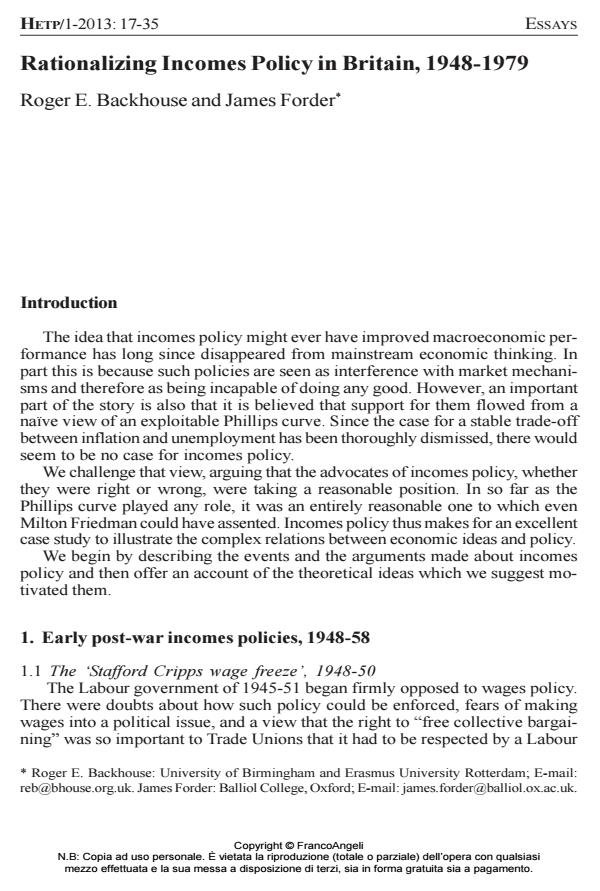Rationalizing Incomes Policy in Britain, 1948-1979
Titolo Rivista HISTORY OF ECONOMIC THOUGHT AND POLICY
Autori/Curatori Roger E. Backhouse, James Forder
Anno di pubblicazione 2013 Fascicolo 2013/1
Lingua Inglese Numero pagine 19 P. 17-35 Dimensione file 133 KB
DOI 10.3280/SPE2013-001002
Il DOI è il codice a barre della proprietà intellettuale: per saperne di più
clicca qui
Qui sotto puoi vedere in anteprima la prima pagina di questo articolo.
Se questo articolo ti interessa, lo puoi acquistare (e scaricare in formato pdf) seguendo le facili indicazioni per acquistare il download credit. Acquista Download Credits per scaricare questo Articolo in formato PDF

FrancoAngeli è membro della Publishers International Linking Association, Inc (PILA), associazione indipendente e non profit per facilitare (attraverso i servizi tecnologici implementati da CrossRef.org) l’accesso degli studiosi ai contenuti digitali nelle pubblicazioni professionali e scientifiche.
Prices and incomes policies, aimed at directly controlling the rate of growth of prices, wages and profits, were a central element in British macroeconomic policy making from the Second World War until 1979. This paper revisits the operation of such policies and the rationales offered during this period. The only argument that makes sense in terms of modern orthodox theory, that an incomes policy can lower expectations of inflation, was very rare. The rationales more often suggested related closely to the institutional details of wage bargaining in oligopolistic labour markets. Virtually no one perceived labour markets as competitive with the wage determined by the marginal product of labour. But this argument gave the policy a significant and later forgotten rationale.
Parole chiave:Incomes policy, inflation, Phillips Curve, labour markets
Jel codes:B2, E31, E62
- Economic Power and the Financial Machine: Competing Conceptions of Market Failure in the Great Depression Roger E. Backhouse, in History of Political Economy /2015 pp.99
DOI: 10.1215/00182702-2007-3130463 - Price controls against ‘profit-led inflation’: Lessons from the incomes policy debate Basile Clerc, in Cambridge Journal of Economics beag004/2026
DOI: 10.1093/cje/beag004 - Richard Kahn and Israeli Economic Policy, 1957 and 1962 Daniel Schiffman, in SSRN Electronic Journal /2013
DOI: 10.2139/ssrn.2373517 - Price Stability and the Origins and Early Influence of the Phillips Curve on British Policy Debates Carlo Cristiano, Paolo Paesani, in History of Political Economy /2018 pp.483
DOI: 10.1215/00182702-6608917 - What Is This “Tranquility”? A Reply to Nelson Carlo Cristiano, in History of Political Economy /2024 pp.729
DOI: 10.1215/00182702-11242685 - Monetary policy and price stability in British post-war debate: restatement of evidence from economists’ papers presented to the Radcliffe Committee Carlo Cristiano, Paolo Paesani, in The European Journal of the History of Economic Thought /2018 pp.1311
DOI: 10.1080/09672567.2018.1523444 - HARRY JOHNSON ON THE PHILLIPS CURVE James Forder, in Journal of the History of Economic Thought /2017 pp.503
DOI: 10.1017/S1053837217000554 - The Shaping of Incomes Policy in the Eighties. The Contribution of Ezio Tarantelli Giovanni Michelagnoli, in HISTORY OF ECONOMIC THOUGHT AND POLICY 2/2015 pp.37
DOI: 10.3280/SPE2015-002003 - The Neoclassical Synthesis and the Emergence of Heterodox Economics Roger Backhouse, in SSRN Electronic Journal /2014
DOI: 10.2139/ssrn.2782545 - Economic Power and the Financial Machine: Competing Conceptions of Market Failure in the Great Depression Roger Backhouse, in SSRN Electronic Journal /2014
DOI: 10.2139/ssrn.2602710 - The Role of Economic Advisers in Israel's Economic Policy Daniel Schiffman, Warren Young, Yaron Zelekha, pp.51 (ISBN:978-3-319-60680-4)
- Richard Kahn and Israeli Economic Policy, 1957 and 1962 Daniel Schiffman, in HISTORY OF ECONOMIC THOUGHT AND POLICY 1/2014 pp.31
DOI: 10.3280/SPE2014-001002 - A history of aggregate demand and supply shocks for the United Kingdom, 1900 to 2016 Robert Calvert Jump, Karsten Kohler, in Explorations in Economic History 101448/2022 pp.101448
DOI: 10.1016/j.eeh.2022.101448
Roger E. Backhouse, James Forder, Rationalizing Incomes Policy in Britain, 1948-1979 in "HISTORY OF ECONOMIC THOUGHT AND POLICY" 1/2013, pp 17-35, DOI: 10.3280/SPE2013-001002